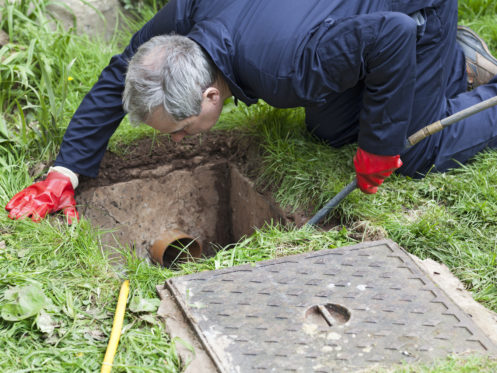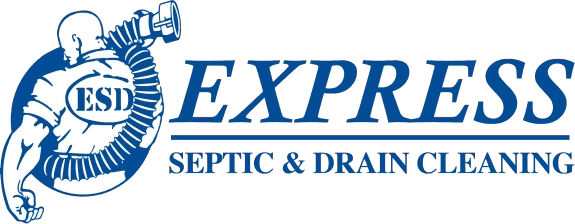When to Pump a Septic Tank
Without septic tanks, most modern rural living would not be possible. As useful as septic tanks can be, though, they do have some potential challenges that every Nampa homeowner should know about. Fortunately, you can address many of these challenges simply by properly maintaining your septic tank. An important part of septic tank maintenance is septic tank pumping. Although every septic tank is different, it’s important to keep a few rules in mind so that you don’t go too long without pumping your septic tank. Here are a few tips from the septic tank experts at Express Septic & Drain Cleaning that will help make managing your septic tank much easier.
How Does a Septic Tank Work?
A septic tank is basically designed to be a separator for the wastewater that exits your home. Since solid waste is denser than water, it sinks to the bottom of your septic tank. Grease, oil, and other substances are less dense than water and float on the water’s surface. By placing a drain pipe in the middle of the septic tank, the water can exit the tank without becoming choked with the other waste products. It’s the products that are left behind in the septic tank that need to be pumped out at regular intervals. After the wastewater leaves the septic tank, it heads to a drain field, where perforated pipes allow the water to seep into the ground so that biological processes can remove harmful bacteria from the water.
Measuring Tank Levels
The best way to determine if a tank needs to be pumped is to measure the levels of grease, also known as scum, and solid waste, also known as sludge, present in the tank. The process for checking the sludge level is somewhat similar to checking the engine oil levels in your car. Using a long PVC pipe wrapped in a towel, you need to put the measuring stick into the tank until it contacts the bottom of the tank. When you pull the stick out, you’ll be able to see the depth of the sludge based on how much of the towel is dirty. To check for scum levels, you’ll want to use an L-shaped measuring stick, first establishing a reference point by finding the bottom of the T-outlet and then bringing the stick up until you find the bottom of the scum layer. Until you know how quickly sludge and scum build up in your tank, Express Septic & Drain Cleaning recommends checking these levels at least once a year.
Maintaining Good Bacteria
A major part of maintaining a properly functioning septic tank is maintaining proper levels of good bacteria. The bacteria in your septic tank help to break down the solid waste that leaves your home so that sludge levels don’t rise as quickly. This means that if you take care of the good bacteria, you likely won’t need to pump your tank as often. One way to help feed the bacteria in your septic tank is to flush a packet of yeast down a toilet in your home at least once a month. If the bacteria are struggling to find something to eat, the yeast will provide them with an easy meal. Additionally, you want to make sure that no pesticides or other harmful chemicals end up in your septic tank since these chemicals can kill good bacteria.
Different Needs for Different Homes
Ultimately, the frequency at which you pump your septic tank depends on the needs of your home. If you move a larger family into a smaller home with a smaller septic tank, you’ll need to pump your septic tank more often. Another important factor is the overall volume of wastewater that your family produces. If you have older toilets that use large amounts of water every time you flush, the wastewater in your tank could build up faster than the septic tank is able to separate the solid waste from the liquid wastewater. That’s why it’s a good idea to use low-flow plumbing fixtures throughout your home, especially if you have a large number of people living in your home.
A Good Rule of Thumb
While there’s no hard-and-fast rule for septic tank pumping, the pros at Express Septic & Drain Cleaning generally recommend pumping your tank every three to five years. To be sure, the factors listed above can increase or decrease this interval, but for a septic tank that’s properly sized and functioning correctly, this is the pumping interval that you can expect. If the interval is substantially less than three years for your septic tank, you may want to look into why your septic tank is filling up more quickly than expected. By addressing the problem at its source, you will likely save money in the long run.
Problems With Infrequent Pumping
If you don’t keep track of the levels of sludge and scum in your septic tank, you could face major problems. Since a septic tank is the only way for your home to rid itself of wastewater, waiting too long to pump your tank could cause untreated wastewater to back up into your home. This typically occurs because the sludge levels in your tank will get too high, allowing the sludge to leave the tank and clog the perforated pipes in the drain field. After the pipes become completely clogged, the only other place for the wastewater to go is back into your home, creating a messy and potentially hazardous problem.
Signs of a Clogged Tank
Before you have to deal with cleaning solid waste out of your bathroom, it’s important to know the signs of a clogged drain so that you can have Express Septic & Drain Cleaning pump your tank before it’s too late. One major red flag to look for is slow drains in your home. If just one drain in your home is slow, you probably have a localized clog you need to deal with. If all of the drains are slow, though, your septic tank likely needs immediate attention. Something else to look for is grass growing unusually well in your backyard. This happens when the perforated pipes in the drain field clog and begin releasing the wastewater into your yard instead of into the soil. The wastewater acts as a fertilizer for your lawn, causing it to grow unusually well. Bad odors and pooling water are two more problems to be on the lookout for as a septic tank owner.
Taking Care of Your Septic Tank
At Express Septic & Drain Cleaning, we take pride in keeping our customers’ septic tanks operating optimally at all times. Since our company only focuses on one thing, you can be sure that we have the expertise to take on any septic tank problem. That’s why we’ve been able to serve this community for over 15 years, creating countless satisfied customers along the way. Our honesty and service allow us to maintain an A+ rating with the Better Business Bureau, a distinction we proudly work to uphold day after day. To learn more about taking care of your septic tank and what to do when things go wrong, contact us at Express Septic & Drain Cleaning today.



